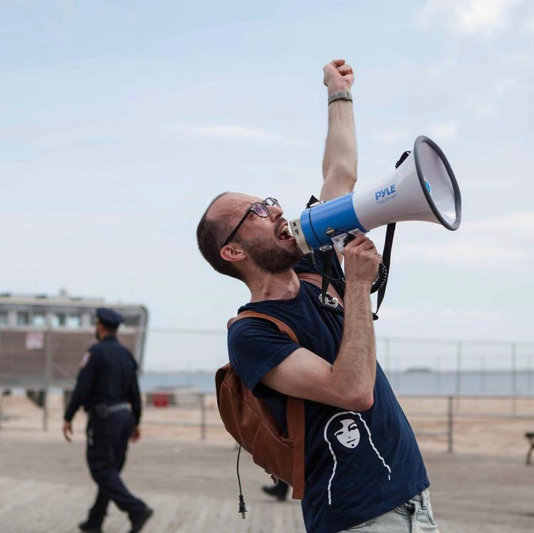- About
- Topics
- Story
- In-Depth
- Picks
- Opinion
- News
- Donate
- Signup for our newsletterOur Editors' Best Picks.Send
Read, Debate: Engage.
| topic: | LGBT Rights |
|---|---|
| tags: | #LGBTQ Rights, #Russia, #Chechnya |
| located: | Russia |
| by: | Lyosha Gorshkov |
Chechnya, a tiny republic in southern Russia, has become the epitome of fear, hatred, xenophobia, and new era of genocide; namely, a queer genocide. The reports presented by the Human Rights organizations1 contain jaw-dropping details— ones that bear chilling similarities to the Nazis concentration camps.
We gradually learn more about the humiliation, electrocution, starvation, rape, and severe beatings that LGBTQI individuals endure at the hands of Chechen officials, and of the diabolic plan of Chechnya’s leader, Ramzan Kadyrov, to eliminate the “sin” from the Republic by encouraging “honor killings”.
Since April 2017, over 200 victims of the LGBTQI purge in Chechnya have been rescued by the Russian LGBT Network2 and safely transferred to some European countries and Canada. Currently, the Russian LGBT Network is conducting another evacuation due the new crisis in Chechnya that broke in December 2018.
Sadly, the U.S. has not taken any LGBTQI refugees from Chechnya, despite the multiple rounds of negotiations between government agencies, which simply faded away without any outcome. This doesn’t surprise me in the least, considering the current political climate and anti-immigrant stances popular in America. One aspect of the issue I find most troubling, however, is the deeply rooted Islamophobia that rises to the surface in this case. Following The tragic events of 9/11 and Boston Marathon, Muslims have been “othered” and scapegoated, and it seems that many people are hypnotized by the Muslim-ban rhetoric and are convinced that all Muslims are “dangerous”. This misconception, no doubt, is one of the main obstacles preventing victims of the queer purge in Chechnya from being welcomed at the harbor of Liberty.
I would also claim that queer Chechens who managed to flee Russia are not completely safe in those countries which accepted them. It is no secret that the non-queer Chechen diaspora3 in Europe is powerful, relatively big, and well connected to the Motherland. We have already heard the story of a gay Chechen who had been rescued and transferred to a European country, where he appeared in a local magazine with his chilling testimony, and subsequently was forced to release a video in which he publicly apologized before the Chechen nation and Kadyrov himself for “bringing a shame and disgrace.” Since then, he has disappeared from the radar. We can speculate about that, but it is crystal clear that queer Chechens, even once rescued, live in a state of extreme fear and public scrutiny. Therefore, I urge the media to be more sensitive and careful with narrating such stories, and think twice before chasing the sensation.
As for the international response to the genocide—protesters have been gathering in public places all around the globe, politicians have been issuing petitions, declarations, and statements in condemnation of the purge, and the media has been circulating terrifying facts about the persecution, torture and killings of LGBTQI individuals in a Chechnya. Some foreign governments (mostly European) attempted to push the Kremlin to act and investigate these crimes, but the Russian government dismissed all accusations, siding with Kadyrov, who once claimed that gay people did not exist in Chechnya.
Apparently, threats of imposing more sanctions on Russia, public protests, and an international outcry do not bother Mr. Putin. In fact, all those actions serve him and his propaganda machine, perfectly supporting his stances against the West which “tries to destroy Russia” by undermining its “traditions”.
The queer genocide in Chechnya is a most violent outcome of the viciously-promoted anti-LGBTQI politics in Russia. In June 2013, President Putin had signed into a law a “propaganda of non-traditional values” bill. The legislation, by default, aimed at keeping the opposition to the Putin’s regime suppressed. The law has targeted the ‘undesirable’ queer “elements,” which do not fit the national agenda actively promoted by the Russian Orthodox Church along with the State. Appealing to the legislation, groups such as the Cossacks, ultra-patriots, and right-wing folks have declared a hunt on queer people (which they call Safaris) via social media, even offering a monetary reward to anyone who fulfills their obligation to the Motherland by “beating faggots up.” In the atmosphere of growing public hostility, LGBTQI+ people are forced to go back into the closet, or, as in the case of Chechnya, they do not even have that option.
What is to be done? I often get asked by compassionate queers and allies here in the U.S. There is no universal recipe or spell to immediately stop those atrocities in Chechnya or in any other corner of the globe where queer people are suppressed, abused, or discriminated against. There are, however, steps that we can take at this moment:
One is to keep the issue alive by sharing the news and testimonies of the victims. We need to remember, it is happening at real time, in a real place, not in our imagination or another planet. It could happen to any of us regardless of our geo-location, gender, ethnicity, social status, etc.
Another thing people can do is to keep pressing members of Congress and the State Department to take action and bring queer victims of the Chechnya purge to safety in the U.S.
Finally, remember that your freedom depends on your ability to be free from prejudices and embrace the “Other”.
Image credit: Lyosha Gorshkov's Instagram @lyosha_gorshkov
